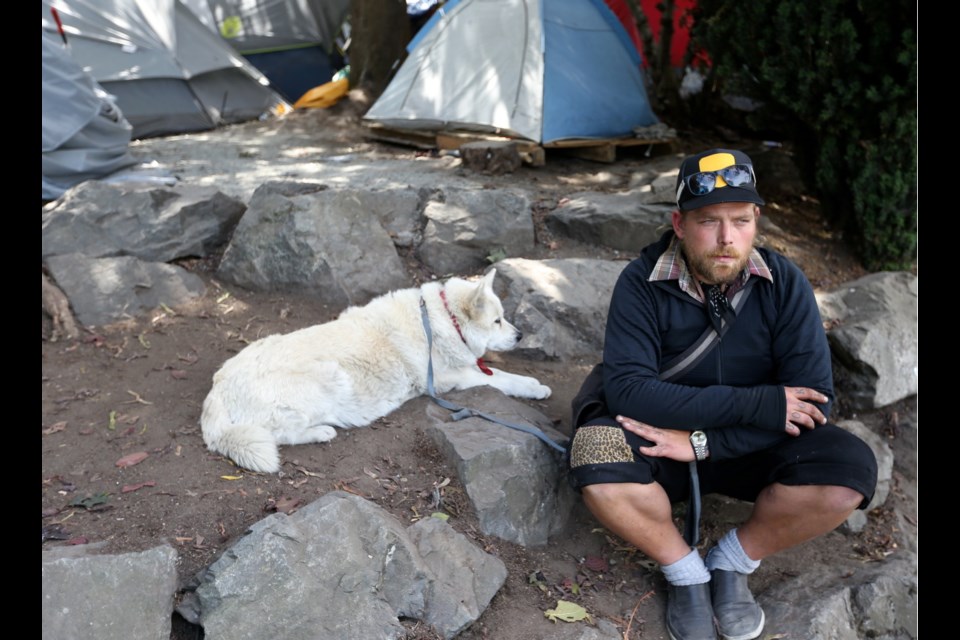Joseph Towstego became homeless at 13 and started living on the streets of Victoria. More than 20 years later, he says the situation is worse — and while places like tent city have raised awareness and helped secure housing, the problem of homelessness is far from being solved in this city.
“I’m hoping the conversation about homelessness that tent city raised doesn’t just go away,” said Towstego, 36, who lives at the encampment on the courthouse lawn at Burdett Avenue and Quadra Street with his dog, Sadie.
Dozens of people have been camping at the site since last fall. The property is owned by the province and is not subject to city bylaws that limit tenting in parks to between 7 p.m. and 7 a.m.
On July 5, B.C. Supreme Court Chief Justice Christopher Hinkson ruled in favour of a bid by the province to close the tent city camp based on evidence of deterioration and safety concerns.
Hinkson ordered that all structures be cleared and residents moved by no later than Aug. 8, when new housing at the 140-unit Central Care Home, at 844 Johnson St., is to be ready.
On Tuesday, Towstego and several other tent city residents planned to take advantage of their last days as a group and hold a march and rally.
Plans for the rally fizzled as some residents shied away from TV cameras that arrived. Others appeared distracted by teams working to move people and their belongings into the Johnson Street facility. And a few had mental-health problems that day.
“I’m sorry. A lot of people are feeling low today,” said organizer Doug, who didn’t want to share his last name. He spoke to media at one of the metal fences that border the homeless camp on the courthouse lawn.
“We rarely get a voice in the media and all that’s written about us.” He said numerous stories in the media are about tent city but told from the perspective of government or law enforcement without including the voices of the homeless people.
This has led to public misconceptions that tent city harbours gangs, underage youth and “a bad crowd,” he said.
“This is not true. … We’re not dangerous or out of control,” said Doug, who moved to the camp because he was tired of having to remove his tent from city parks.
Doug said he also wanted to speak out about a lack of information regarding plans to move tent city residents into housing.
“I put my name down for it, but I haven’t heard anything,” he said. “How many agencies in town are getting government funding to help the poor homeless people? … But I can’t find out anything.”
Details of the Central Care Home move and how to confirm who has a space will be posted at tent city today, said Andy Bond, senior director of housing for Portland Hotel Society, the non-profit contracted to manage the building.
Bond said the first 12 people moved into the care home Tuesday. The organization is working from a list of tent city residents who identified themselves to service providers after the court ruling.
“If someone is not on the list and they are homeless, we will still take their name because there might be space,” he said.
Towstego said he is one of several tent city residents who do not plan to move into supportive housing secured by the provincial government. In addition to the Central Care Home, the province has purchased the Super 8 hotel on Douglas Street and Mount Edwards Court Care Home on Vancouver Street to house tent city campers.
“A lot of people will not be going into the government housing. They will be back in Beacon Hill [park] and other places, camping,” he said. “I don’t want cameras watching me or being told how many guests I can have. I’m 36 years old. I know how to live with neighbours and others.
“I’ve been out panhandling and people are mocking me, saying: ‘Go get your free apartment.’ It’s not that simple.”
Towstego said he would like to be able to afford an apartment or room in a house, but said that is “impossible” for someone on social assistance. In 20 years, he said, the shelter allowance has increased only $50, to $375 from $325.
“That’s nothing. Back then, $325 could get you a bachelor [apartment] or a room. You could do something with that.”
He said he would like to complete his degree in English literature. He never went to high school, but finished one year of university as a mature student.
His favourite writer is Gabriel Garcia Marquez, but he also likes reading about Ernest Hemingway. “He had an interesting life,” said Towstego, whose knuckle tattoos spell BOOKWORM. His dream is to own a used bookstore and get out of homelessness permanently.
“I think about that every day.”



